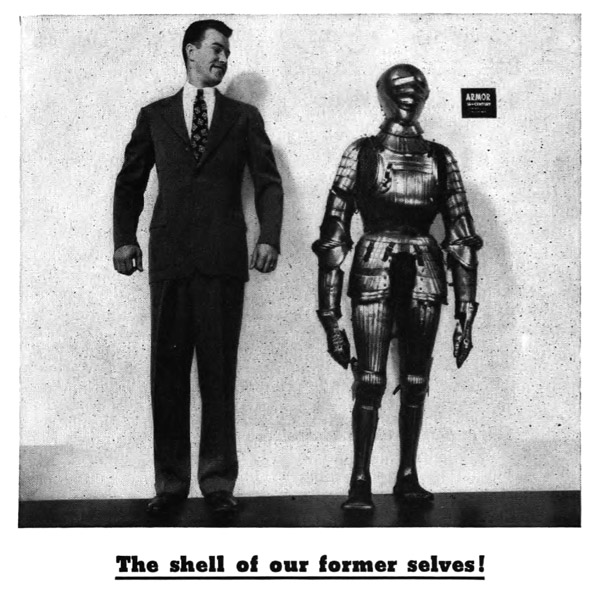
Can capitalism exist without its foundation of heterosexual monogamy? Is polyamory inherently revolutionary? To all these questions we must answer: capitalism is a master of recuperation. What first shakes it, soon motivates it, later strengthens it. We will never know which tactics bring it down until we try. To rupture the consumer myth will take more than protests in the streets and boycotts of consumer goods. It’ll require a fundamental shift in the structure of society, a revocation of our libidinal investment. Whether that’ll take the form of polyamory or simply neighbors getting to know each other remains to be seen. —“Is Polyamory Revolutionary?” Micah White, Adbusters
Please consider that your “backlash against identity categories such as hipster or metrosexual” might in fact “generate complex and nuanced identity strategies”–and who wants that?
behold the freelancer: pajamas, stubble, and glory;
we will all soon starve
In the beginning, the media’s fascination with Greene was understandable. When the “unemployed 32-year-old black Army veteran with no campaign funds, no signs, and no website,” as Mother Jones’s Suzy Khimm described Greene in one of the first national articles about him, came out of nowhere to win the South Carolina Democratic primary in June, it was appropriate for journalists to try to figure out more about the candidate and his improbable victory. And as their reporting raised more questions—including accusations from prominent South Carolina Democrats, such as James Clyburn, that Greene’s victory was the result of a Republican dirty trick—the media swarm that engulfed Greene, who conducted almost all of his interviews from the rundown home he shared with his 81-year-old father in the tiny town of Manning, was painful to watch, but, at the same time, seemingly necessary. —“Why the Media Won’t Stop Laughing at Alvin Greene,” Jason Zengerle, The New Republic
Religious iPhone hoarding repurposed as a day of reflection;
you may all be Stallone, but not me…well, maybe;
Iraqi spank spike!
The fishermen also remember how, after his retirement in 1951, DiMaggio brought his second wife, Marilyn, to live near the wharf, and sometimes they would be seen early in the morning fishing off DiMaggio’s boat, the Yankee Clipper, now docked quietly in the marina, and in the evening they would be sitting and talking on the pier. They had arguments, too, the fishermen knew, and one night Marilyn was seen running hysterically, crying, as she ran, along the road away from the pier, with Joe following. But the fishermen pretended they did not see this; it was none of their affair. They knew that Joe wanted her to stay in San Francisco and avoid the sharks in Hollywood, but she was confused and torn then – “She was a child,” they said – and even today DiMaggio loathes Los Angeles and many of the people in it. He no longer speaks to his onetime friend, Frank Sinatra, who had befriended Marilyn in her final years, and he also is cool to Dean Martin and Peter Lawford and Lawford’s former wife, Pat, who once gave a party at which she introduced Marilyn Monroe to Robert Kennedy, and the two of them danced often that night, Joe heard, and he did not take it well. He was possessive of her that year, his close friends say, because Marilyn and he had planned to remarry; but before they could she was dead, and DiMaggio banned the Lawfords and Sinatra and many Hollywood people from her funeral. When Marilyn Monroe’s attorney complained that DiMaggio was keeping her friends away, DiMaggio answered coldly, “If it weren’t for those friends persuading her to stay in Hollywood, she would still be alive.” —“The Silent Season of a Hero,” Gay Talese, Esquire (originally published in 1966)


